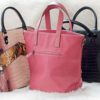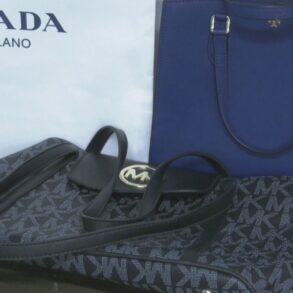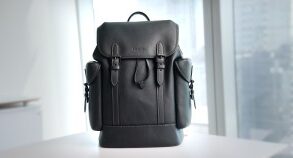Few cities can top Dubai when it comes to shopping.
The City of Gold on the Persian Gulf with more than three million people (75 percent of them expats) sports nearly 100 malls, many of them palatial shopping structures – think six-star browsing experiences.
Given the heat-pounding weather that restricts outdoor activity half the year, these labyrinthine retail megastructures provide all the entertainment one could wish for and with the added sweetness of air-conditioning.
There was a time in the recent past when Dubai was not only the self-proclaimed shopping capital of the world – and ran an annual weeks-long shopping festival to make that point – but the tax free territory was also the city of bargains.
Deals making such luxury goods as gold, jewelry, perfume, carpets and designer handbags, sunglasses and even phones were as plentiful as dates, ripe and ready for the picking no matter what the income bracket.
But while the winter Dubai Shopping Festival is still in motion, the deals are not. Unfortunately, recent visits to Dubai’s notorious souks in the heritage neighborhoods of Old Deira showed gold and silver still selling by the gram but not at prices unavailable elsewhere. A pair of very modest 24-carat gold stud earrings came with $200 price tag. Put in diamonds for $400 more.
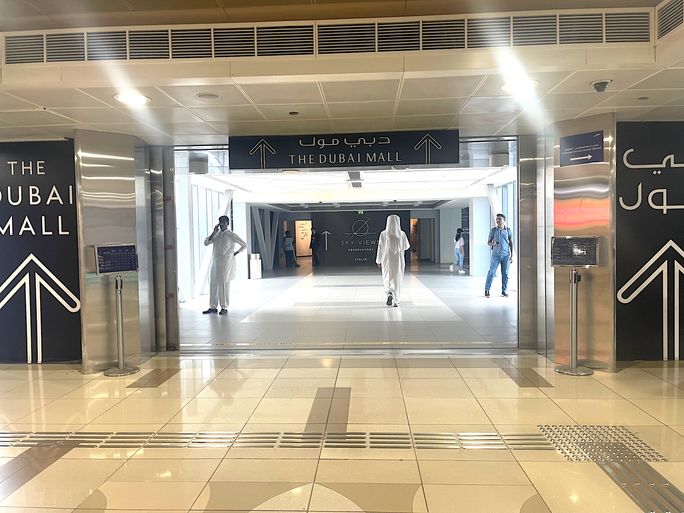
Indoor promenades connect malls, hotels and businesses. (Photo Credit: Lark Gould)
Souks and Steals
Attars or perfume oils are always a bargain in the Middle East but you will have to go through lectures about the whale that produced the ambergris and the quality of the frankincense from saplings in Oman before you will get to the moment where you cut the “only for you” price down and bring on a big frown from the merchant.
What remain bargains in Dubai are the copied designer handbags, scarves and leather goods to be found in the Al Karama District, also in the older neighborhoods not far from the gold and perfume souks. There, it is a pick-your-label frenzy amid stacks of strip mall style shops in squat and unimpressive warrens of small air-conditioned showrooms and then hidden backrooms of neat and well-lit product presentations.
A decade ago, you might whisper to a guy who knows a guy that you are looking for, say, a type of Hermes luxury purse. You would get led to the other guy who would beckon you to follow through dark halls and alleys, inside and around and up this back staircase as if you are hunting a gram of cocaine (note: Dubai is one of the safest places on the planet), not a bauble for Granny.
Eventually you would arrive in a room of broken boxes and strewn packing materials where you would be shown this bag and that bag – a fake Fendi, an exquisite Gucci, how about this would-be Louis Vuitton – impressive facsimiles of pretty much everything but what you were seeking.
Then comes the ask for the price. You say $20. They say $100. You walk away with a copy of last year’s Prada for $35. Exhausted from the ordeal, you head out into the heat and tell the driver (yes, they also have Uber in Dubai but taxis are less expensive) to take you to Burj Khalifa – home to the world’s largest mall – in Downtown Dubai.
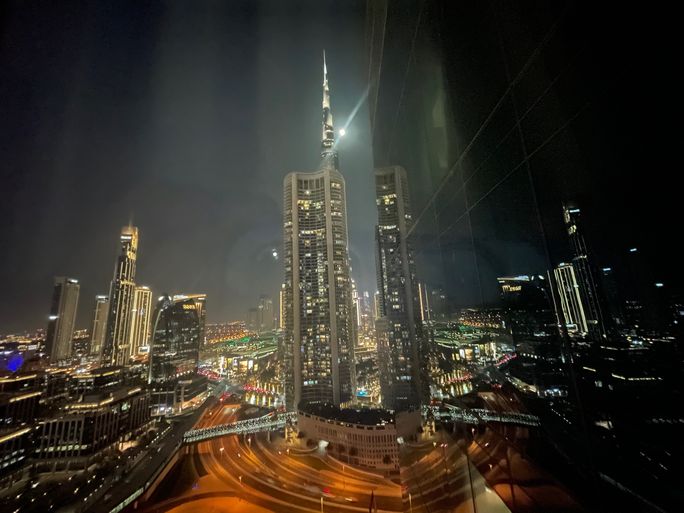
Blue moon over Burj Khalifa. (Photo Credit: Lark Gould)
Shopping on Steroids
While Burj Khalifa is currently the tallest building in the world (2,716.5 feet, 163 floors) it is only fitting it should hover above the largest shopping concourse in the world currently, which is Dubai Mall.
A stop on the Dubai Metro, a mark on the skyline, possibly the most recognizable building in Dubai (along with the iconic sail vision of Burj al Arab hotel), the Dubai Mall rolls everything possible in a shopping experience into one monster location.
Find a world-class aquarium full of sharks, jellyfish and cephalopods; find an Olympic-sized ice skating rink; find a virtual reality park and an outdoor fountain show not unlike (and created by the same designers as) the Bellagio fountain show in Las Vegas; find such uber-precious brand names as Cartier, Chanel, Harry Winston, Valentino, Hermes and more. Find personal shoppers to help navigate the miles of aisles (think 12 million square feet of shopping, 1,200 stores), and exquisite restaurants and cafes for resting between bouts.
And yes, you can also find the usual brand names that make up U.S. malls: Footlocker, Adidas, Timberland, Aldo and even a book store or two. Dubai Mall also brings its very own Chinatown – mostly a collection of Hong Kong-style restaurants in an Asian-themed wing bedecked with red lanterns. Beyond that, step into the kasbah area of the mall for a more comfortable and unpressured time of buying such regional goods as carpets, scents, scarves and gold without emotion-laden haggling.
Visitors to Dubai from the U.S.A. will find prices on all retail items comparable to prices in the U.S. Europeans will find retail tags a good 15-20 percent lower than home. Asian populations will get some value in the upscale brands.
Not far from Dubai Mall is the pyramid-shaped Wafi Mall, now dwarfed by most of the shopping venues around the city but still an enjoyable experience if only for the unusual entertainment to be found. Step into AYA, a multi-room, multi-dimensional, immersion experience that uses lights, sound, colors, shapes, textures and mirrors to create novel and intense interior landscape of special effects – each room a different motif, each chamber its own explosive and stunning surprise.
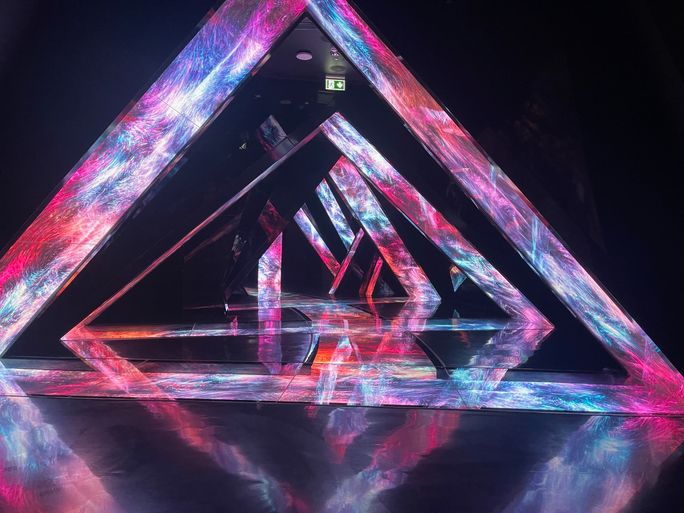
Chamber in AYA Museum at Wafi Mall. (Photo Credit: Lark Gould)
Looking for more? The Mall of Emirates is the answer. The mall made headlines when it opened in 2005 with a ski slope: a winter wonderland of skiers, snowboarders and snowballs in the desert with a small skating rink and an ice castle libations bar. With more than 2.4 million square feet of retail floor space and 630 high-end brands, the shopping venue continues to be a key stop on the attractions circuit and a preferred way to keep cool while the sun shines.
Not far find the newest museum attraction in Dubai, find the Museum of the Future along the city’s main traffic artery of Sheikh Zayed Road. While it is not attached to a shopping mall per se (the gift shop rocks, however), the attraction is a wild ride in this already futuristic city and offers state of the moment glimpses into what is possible in the next 50 years, both globally and locally.
It starts with a Disney-esque elevator ride to an orbiting spaceship and slowly takes guests back to earth as they descend floors, on inward and outer journeys and explorations. Tickets run $40 to $108 for a VIP pass with events and groups given special attention.
Next Stop Shopping in Dubai
In Dubai, “next” is the operative question and in Dubai there is always a next. In shopping, that means Dubai Creek Square. In development by Emaar Properties at a cost of more than $1.5 billion, the project aims to double the size of Dubai Mall, top Burj Khalifa with the new Dubai Creek Tower city centerpiece, and seize all the records therein. Plans call for a tech-forward swirl of soon to become shopping essentials, such as smart fitting rooms, interactive mirrors, 3-D printed clothing and accessories and A.l. robots to suggest what to buy.
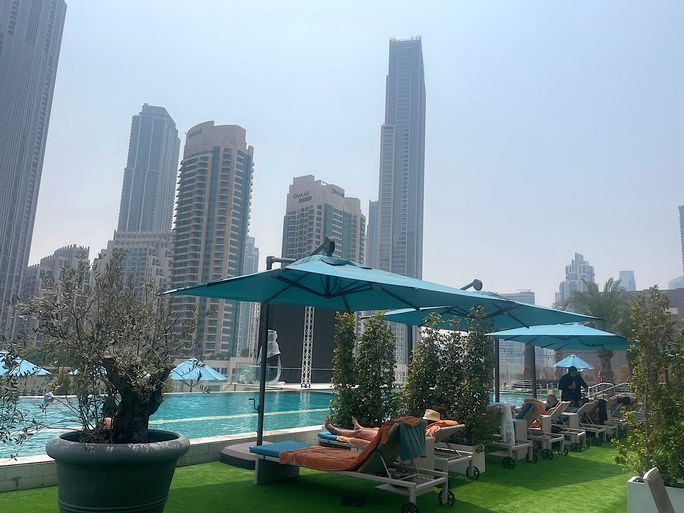
Sunning in the City at Sofitel. (Photo Credit: Lark Gould)
The urban architecture of it all brings a back-to-the-future appeal within an ancient Babylon setting containing palm-lined streets traversed by driverless “cars” and gleaming escalators amid hanging gardens, all under a colossal glass canopy letting in the desert sky. The mini city comes with 10,000 residential units, at least 1,500 hotel rooms and even a Chinatown — set to be the largest Chinatown in the Middle East. It will also bring a dedicated arts district, technologically-enhanced Ice Adventure and a rooftop waterpark and water slide careening to the bottom floor.
In a smart move, the megamall project is going up in a location just 10 minutes from Downtown Dubai and equally close to Dubai International Airport (DXB). Beyond the airport’s own retail wonderland, the location makes it the closest retail destination to the 85 million passengers transiting through the airport annually.
Naturally there will be a dedicated metro link straight from the airport to Dubai Square’s Grand Central Station when all is completed. Announced in 2018 and delayed by the pandemic, a definitive opening date for Dubai Creek Square has not yet been set but 2025 is the projected target.
Take the Tour
If future shopping is not in the cards, visitors can take it back a few centuries and get to know the ins and outs of Old Dubai through fascinating, by-the-cuff tours with Frying Pan Adventures. These include not only tips for shopping and navigating the best products in the souk, but also tastings of items that keep the tradition of these lands but are rarely experienced by travelers.
Topics From This Article to Explore
This post was originally published on this site be sure to check out more of their content.

